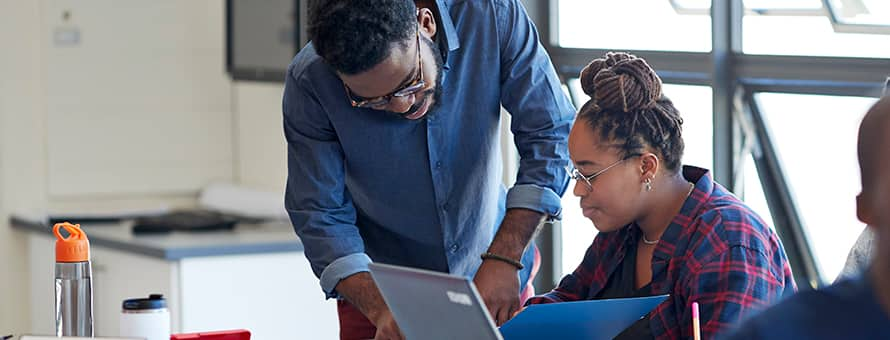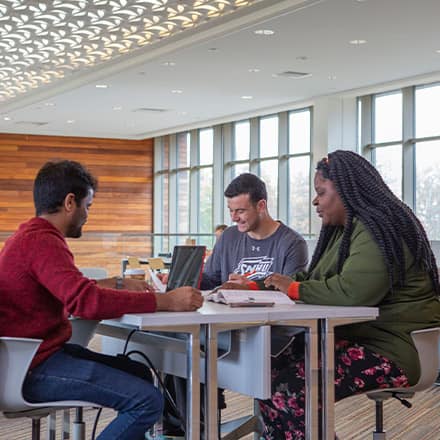10 Qualities of a Good Teacher

A good teacher can make a world of difference in a student's life, impacting everything from their classroom learning to their long-term success. If you're considering a career in education – or looking to boost it with a Master of Education (MEd) – it's important to explore the qualities of a good teacher.
Research from the Economic Policy Institute shows that good teachers are the single most important factor that contributes to student achievement in the classroom, more important than facilities, school resources and even school leadership.
A study from the American Economics Association (AEA) found that improvements in teacher quality positively impact everything from the quality of colleges students attend to students’ future salaries, the quality of their neighborhood and even their future participation rates in 401k savings plans (AEA PDF source).
So, What Makes a Good Teacher?
Southern New Hampshire University (SNHU) education faculty and university students shared their thoughts on the qualities that make effective teachers stand out.
1. Good Teachers Are Strong Communicators.

Tanguay got his start as a high school math teacher and said that many students came to his class feeling afraid of math, discouraged by their prior experiences and too overwhelmed to approach the subject positively.
By communicating with students at the beginning of the year about how math applies to their favorite hobbies, sports and future careers, Tanguay said his students were able to approach the subject in a more enjoyable way that better supported their learning.
“I’m a firm believer in communication in all forms,” he said. “As a leader, communication is a tool for overcoming fear.”
2. Good Teachers Listen Well.

Great communication doesn't stop when the teacher is done talking. Listening well is one of the most important skills needed to be a teacher.
“Teachers that are skilled in listening and observing often pick up on what isn’t being said, such as any anxieties a student may have, and can then help the student build their skills and confidence levels," said student Kristine Ducote, who is earning her bachelor's in criminal justice.
Student Latricia Maddox, who is studying for a bachelor's in business, said that effective listening skills also help a teacher better understand their students and tailor lessons to reach them how they learn best.
“If an educator can truly hear a student, they can learn how to reach them where they are,” she said. “This will open the door for them to receive and learn the lesson that is being taught.”
3. Good Teachers Focus on Collaboration.

Working in education means you’re never truly working alone. From paraprofessionals and teaching assistants to other classroom teachers and school leaders, working as a teacher often means working effectively in a group. It's also important to keep an open mind and learn from other educators.
The key to success in this kind of environment, Tanguay said, is the ability to collaborate. "You really need to be able to fill various roles in order to collaborate effectively," he said. "If you already have someone on your team who is going to be the one to critique all of the suggestions made, then you don't need to join in on that. Instead, maybe you need to be the person who is going to come up with creative ideas. You need to have that flexibility."
4. Good Teachers Are Adaptable.

Effective teachers need to be able to work in a constantly evolving environment and adjust their teaching methods based on the age of their students, the resources available and changing curriculum, practices and requirements.
As a teacher since the 1980s, SNHU education professor and on campus undergraduate program chairman Dr. Audrey Rogers said she’s seen tremendous changes in the education field throughout her career, particularly with the rise in access to the internet, computers and other technology. What is teaching going to look like in another 30 years? The only thing certain, Rogers said, is change.
“Change is a constant,” she said. “Learning how to adapt and adjust, that’s been one of the skills that’s been most helpful in my career. It’s about keeping my finger on the pulse of who my students are over time and all the trends, standards and new research, and being able to continually improve.”
Adaptability is also one of the key skills needed to be a teacher who may be educating students of varying grade levels or different learning styles, Tanguay said.
“You have to be able to adapt based upon your audience,” he said.
5. Good Teachers Are Engaging.
Being able to engage students with humor, creative lessons and a strong classroom presence is an important part of what makes someone a good teacher, Tanguay said.
“If you were to envision that teacher that you would want in your life, even now, you’re going to want someone who is very engaging in front of the classroom,” he said. “A good teacher will perform for their students to keep them going... It’s not about sitting back and just lecturing, it’s about engaging in the work.”
What an engaging teacher looks like will vary depending on grade level and subject matter, Tanguay said.
In kindergarten, an engaging teacher might be one who gets down on the floor to do activities with their students on their level. In high school, an engaging teacher may be one who thinks outside the box, adds humor to their lessons and finds creative ways to bring learning into the real world.
6. Good Teachers Show Empathy.
Another key to engaging students and improving their learning is to treat each student as an individual, by being empathetic and understanding to what may be going on in their lives, Tanguay said.
“We need to take a moment to think back and think about what could be going on in this student’s life,” he said. “It’s so important to be observant, attentive, empathetic and always have a positive attitude.”

“Something that may be easy for one student may not be so easy for someone else,” she said. “Everyone learns differently, whether it be faster or slower than normal, learns better by writing, reading or hands-on. Teachers need to always keep this in mind and always pay close attention to ensure each student is on the track they need to be.”
7. Good Teachers Have Patience.
No matter what grade level you're teaching, your patience will be tested while working as an educator.
Whether you’re managing classroom behavior, working with colleagues with different views, or communicating student issues or progress with parents, patience is one of the most important skills to practice as a teacher.
“More often than not you actually have to have more patience with the parents than you do with the students,” Tanguay said. “Parents are coming in with their perceptions of what happened to them when they were students or previous experiences that may have been detrimental to their child... You have to be patient and understanding of them.”
8. Good Teachers Value Real-World Learning.
Teachers who bring their students’ learning into the real world are often some of the most engaging. But it’s important for teachers to bring their own learning into the real world, too.
One of the best preparations for effective teaching is to ensure that education students get plenty of classroom experience early on in their degree programs, Rogers said.
For education majors in SNHU's on campus program, this preparation includes embedded coursework that begins in a student's freshmen year. They spend time at a local school once a week to collaborate with teacher partners and apply their learning to the classroom. A year-long student teaching experience is also a powerful way to ensure soon-to-be teachers have the time to hone their teaching skills, Rogers said.
"Our students have that benefit of seeing the practical application (of) what they're learning in the moment they're learning it," she said.
Find Your Program
9. Good Teachers Share Best Practices.
A willingness to share knowledge and experiences with others is one of the most important qualities of a good teacher, Rogers said.
Education is a hands-on field and often requires experimentation within the classroom to discover which methods of communicating with students work best. Part of being an effective teacher is sharing your findings and best practices with others in the field, Rogers said.
“I always challenge my students to think, ‘What is your contribution?’” she said. “Are you brave enough to post on Twitter about your ideas on technology integration in the classroom? Your willingness to share your practice, to keep an open door, to be transparent and to be observed are an important part of your teaching.”
10. Good Teachers Are Lifelong Learners.
One of the key skills needed to be a good teacher is a dedication to continued education and a love of learning.

Whether you’re learning more about your subject area, learning new methods of communication or even exploring how to bring more technology into your classroom, continuing to expand your own knowledge is key to expanding that of your students.
“Those dedicated to their subjects with a passion for learning make the best teachers," said student Jennifer Gardner, who is earning a bachelor's in mathematics. “They also need to have a desire to pass on that knowledge.”
Ducote said it’s important for teachers to never feel as though they’ve learned it all, and to remain open to new experiences.
“No matter your education level, you can learn something from everyone you encounter, including fellow educators as well as students,” she said. “Being willing to continually add tools to your toolbox – even unconventional ones at times – will keep things new and exciting, as well as giving you excellent skills.”
Learn the Characteristics of Effective Teaching

If you’re interested in starting a career in education, it’s important to first focus on your own learning. Whether you’re seeking a bachelor's degree in education, an education master’s degree or even a Doctor of Education (EdD), building a strong foundation of knowledge and real-world experiences is key to becoming a good teacher.
No matter where your career path takes you – whether to an elementary school, secondary school or even to the university level – your teaching can have a profound impact on the lives of students, and your education is the foundation for that work.
“Teachers make such a huge impact on their students’ lives,” said student Donna Whisman, who is earning her bachelor's in communication. “I believe that being a teacher is a very special gift, and those that have that gift make a positive, lasting impression on the lives of their students that can totally change the trajectory of their lives.”
Danielle Gagnon is a freelance writer focused on higher education. Connect with her on LinkedIn.
Explore more content like this article

How to Survive High School and Prepare for College

How Long Does it Take to Get an Associate Degree?

How to Get a Master's Degree
About Southern New Hampshire University

SNHU is a nonprofit, accredited university with a mission to make high-quality education more accessible and affordable for everyone.
Founded in 1932, and online since 1995, we’ve helped countless students reach their goals with flexible, career-focused programs. Our 300-acre campus in Manchester, NH is home to over 3,000 students, and we serve over 135,000 students online. Visit our about SNHU page to learn more about our mission, accreditations, leadership team, national recognitions and awards.

